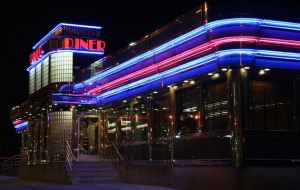Humanist EDge: Humanist Philosophy at the Diner

Hartford Area Humanists is one of the more recent additions to Connecticut’s active and diverse secular community. This vibrant chapter of the American Humanist Association began as a monthly social dinner in the Hartford area that was run by a New Haven group, the Humanist Association of Connecticut. As the local meeting grew, it became evident that there was a need for a humanist group in the Hartford area.
My involvement in the Humanist Institute was invaluable to me as I served as one of the organizers of the Hartford Area Humanists and as its founding president. After only three years, we now have nearly 500 people in our Meetup. We run regular monthly meetings with guest speakers, social and cultural outings, outdoor activities, charitable and philanthropic projects, and outreach events.
Although I’m no longer the group’s president, I remain active as its programming director. For just over a year, I have also served as the moderator for one of the more interesting monthly activities: the Humanist Dinner Club.
The Dinner Club meets the second Thursday of each month in the back room of a diner in East Hartford. Participants order blue-plate specials, Greek specialties, omelets, and other diner fare. After the orders are placed, we turn to the serious business of discussing philosophy. We select a topic in advance for each meeting that involves some aspect of humanism. Discussion topics have included moral dilemmas, Socratic dialogues, racism, suicide, and animal welfare.
Group members prepare in advance by reviewing designated materials, which typically include some reading (frequently articles from the Humanist) and a podcast or video. The preparation time is usually an hour or less, but group members sometimes go beyond the “assignments” and do additional reading. Group members often post suggestions for supplemental materials on a group message board. It may seem odd for adults to do “homework,” but members like Stan Greenberg say they enjoy the preparation, which Greenberg calls “enlightening and thought-provoking.”
As enlightening as the advance reading may be, most participants find the discussion itself to be the most rewarding part. Sarah Hambrick, another member, says that the Humanist Dinner Club “gives an all-too-rare forum for structured, intellectual dialogue,” adding that for her, “it’s a salon for the art and science of conversation.” Several members have commented during the check-in at the start of each meeting that the discussion is one of the best events in their month.
When the turnout is large, we divide into smaller groups of six-eight people to ensure that everyone gets an opportunity to participate. We also try to divide ourselves so that each table includes a variety of different perspectives. Fortunately, we have had good success attracting diverse participants. Member Rebecca Williams is grateful for the diversity, noting that “the eclectic makeup of the group offers opinions that make you think, reflect, and look at thought-provoking topics in a whole new light.”
I started the Humanist Dinner Club, in large part, because I hoped to replicate the vibrant and intellectual experience that I enjoyed so much during my participation at the Humanist Institute. Yet, while participants may enjoy the camaraderie and the stimulating conversation, the Humanist Dinner Club has a broader purpose. We seek to promote a deeper understanding of humanist philosophy and values so that our members are better able to “lead ethical lives of personal fulfillment that aspire to the greater good of humanity.”
My fellow diner Sarah Hambrick best explains how these discussions help achieve that goal: “The benefit from developing and practicing techniques of rational and respectful discourse cannot be overestimated: ultimately our ability to resolve problems planetary and personal depends on our capacity for rational thought and communication.”
